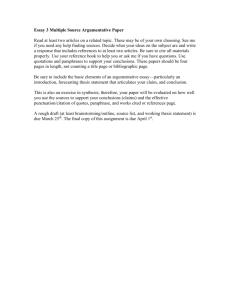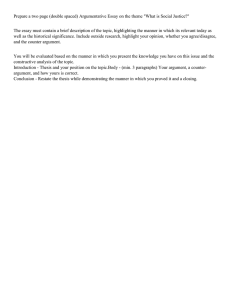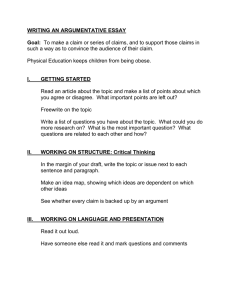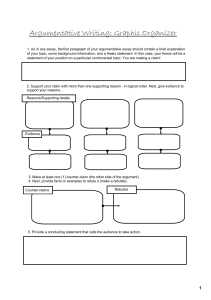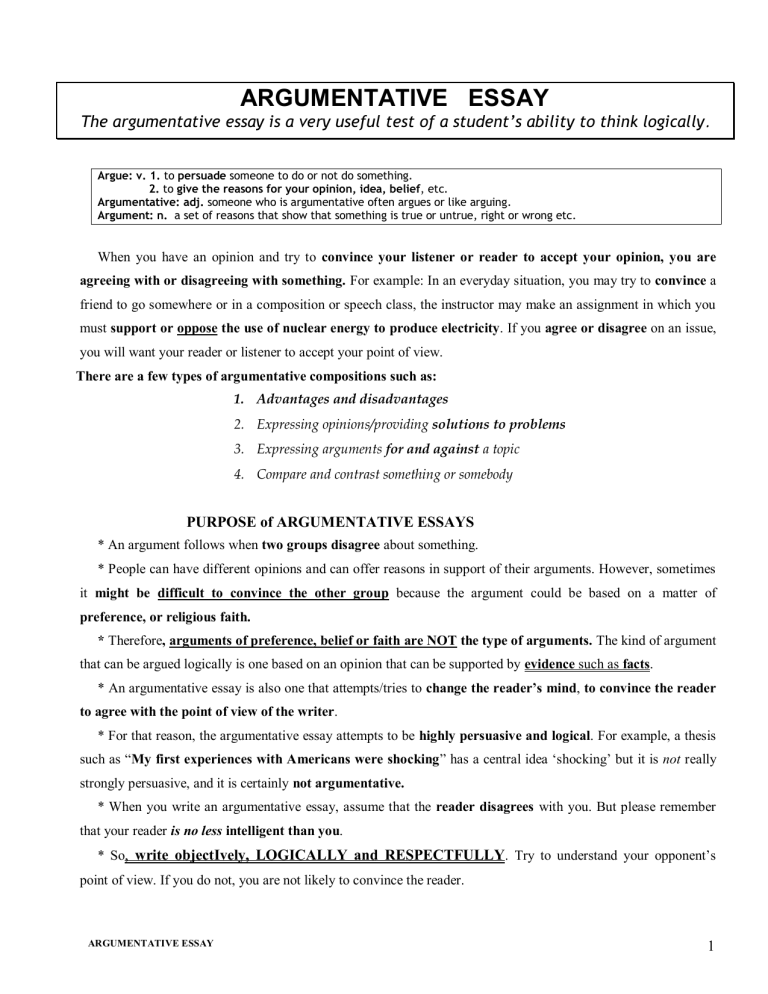
ARGUMENTATIVE ESSAY
The argumentative essay is a very useful test of a student’s ability to think logically
.
Argue: v. 1. to persuade someone to do or not do something.
2.
to give the reasons for your opinion, idea, belief , etc.
Argumentative: adj. someone who is argumentative often argues or like arguing.
Argument: n. a set of reasons that show that something is true or untrue, right or wrong etc.
When you have an opinion and try to convince your listener or reader to accept your opinion, you are agreeing with or disagreeing with something. For example: In an everyday situation, you may try to convince a friend to go somewhere or in a composition or speech class, the instructor may make an assignment in which you must support or oppose the use of nuclear energy to produce electricity . If you agree or disagree on an issue, you will want your reader or listener to accept your point of view.
There are a few types of argumentative compositions such as:
1.
Advantages and disadvantages
2.
Expressing opinions/providing solutions to problems
3.
Expressing arguments for and against a topic
4.
Compare and contrast something or somebody
PURPOSE of ARGUMENTATIVE ESSAYS
* An argument follows when two groups disagree about something.
* People can have different opinions and can offer reasons in support of their arguments. However, sometimes it might be difficult to convince the other group because the argument could be based on a matter of preference, or religious faith.
* Therefore , arguments of preference, belief or faith are NOT the type of arguments. The kind of argument that can be argued logically is one based on an opinion that can be supported by evidence such as facts .
* An argumentative essay is also one that attempts/tries to change the reader’s mind , to convince the reader to agree with the point of view of the writer .
* For that reason, the argumentative essay attempts to be highly persuasive and logical . For example, a thesis such as “ My first experiences with Americans were shocking ” has a central idea ‘shocking’ but it is not really strongly persuasive, and it is certainly not argumentative.
* When you write an argumentative essay, assume that the reader disagrees with you. But please remember that your reader is no less intelligent than you .
* So
, write objectIvely, LOGICALLY and RESPECTFULLY
. Try to understand your opponent’s point of view. If you do not, you are not likely to convince the reader.
ARGUMENTATIVE ESSAY
1
AS A RESULT:
An important point to recall is that when writing to an argumentative essay, your reader may not agree with you.
Writing to persuade is, therefore, more challenging and more imposing than many other types of writing.
Your goal may be to change your readers' minds or move them to action.
Your goal may be to sell a program, defend an idea, or disprove an opponent.
In all these instances, you should consider writing to persuade as an important method for shaping your environment toward your vision of reality.
THESIS STATEMENT in ARGUMENTATIVE ESSAYS
The argumentative thesis takes a side of an issue ; frequently it proposes an approach of action which is often expressed with the modal should ).
In the argument concerning the nuclear power plant , the thesis for a paper on this topic might be:
“Governments should ban further construction of nuclear power plants.”
Someone else might argue:
“The U.S should continue building
PRACTICE 1: Thesis Statement nuclear power plants.”
Study the following thesis statements. Put “ A ” in the blank if the statement is argumentative . Be careful! A statement having “ should” as part of the verb is not automatically argumentative
.
1.
__The earthquake in Gölcük, Turkey, was one of the most destructive in history.
2.
__ Prospective
*
parents should be required to get licenses in order to have children. ( Prospective : future, expected
3.
__ The building codes in Las Vegas, Nevada, are inadequate
*
. (I nadequate: not enough)
4.
__ Some of the Americans I have met are quite hospitable.
5.
__ Students should have a say in the hiring and firing of teachers.
6.
__ Pornographic books ought to be banned from the library.
7.
__ State University should not have a football team.
8.
__The citizens of this state should be allowed to carry guns.
9.
__ The United States ought to allow more immigrants into this country.
PRACTICE 2: Choose one opinion (a or b) from each of the following pairs of thesis statements .
1.
2.
3.
4.
a. It is a good idea for students to work part time while they are going to school. b.
Students should not work while they are going o school. a. Young people should continue to live with their parents after they finish their education. b. Young people should not move away from home after they finish their education. a. Wars are always wrong. b. Wars are not always wrong. a. Exams are not useful. b. Exams do not check students’ knowledge.
ARGUMENTATIVE ESSAY
2
PLANNING/ORGANIZING THE ARGUMENTATIVE ESSAY
When you are planning the argumentative essay, be aware that the essay should contain the following characteristics:
1.
The argumentative essay should introduce and explain the issue or case . The reader needs to understand what the issue is going to being argue.
2.
The essay should offer reasons and support for those reasons. In other words, the essay
3.
should prove its point.
The essay should refute opposing arguments . (refute: to prove wrong by argument or to show that something is invalid/untrue/illogical)
ORGANIZATION of an ARGUMENTATIVE
ESSAY
1.
Introduction.
You can first introduce the problem and give background information necessary for the argument and the thesis
2.
Reasons.
It is usually a good idea to spend one paragraph for each reason. Two or three reasons are typical.
3.
Refutation.
Depending on the points the writer wants to make, one or two paragraphs are typical.
4.
Conclusion .
OUTLINE of an ARGUMENTATIVE ESSAY
INTRODUCTION
Introduction: Background about the topic
Thesis statement: …..
BODY
I.
Pro(for/in support of) argument: (weakest argument that supports your opinion)
II.
Pro(for/in support of) argument: (stronger argument that supports your opinion)
III.
Pro(for/in support of) argument: ( strongest argument that supports your opinion)
IV.
Con (against/negative): (Counter/oppose arguments and your refutation)
CONCLUSION
Summary, solution, prediction, or recommendation
USEFUL TIPS for ARGUMENTATIVE ESSAYS
To write well developed paragraphs:
Avoid strong feelings
(don’t say: nobody does this, or it is impossible to disagree with me)
Use generalizations (e.g. people say/believe/consider)
Do not use generalization
(e.g. everybody believes that…..)
Do not use strong personal expressions (e.g. I think)
Use linking words (e.g. therefore, although, however etc.)
Use sequencing (e.g. firstly, secondly, lastly)
Make reference to other sources
(e.g. The government claims that…)
Give examples – not personal thoughts (e.g. products such as sprayer can destroy the environment)
Give up banal introductions . Write something more original
(Don’t write: This topic has been important since ancient times. When? Too vague = unclear)
ARGUMENTATIVE ESSAY
3
EXPRESSING ARGUMENTS FOR and AGAINST TOPIC
When you are giving arguments for and against a topic you should present both views in a fair way .
Discuss them in equal details and show no bias (=prejudice).
OUTLINE:
Introduction: Introduce the subject of the essay. State why it is an important issue at the present time.
Main body:
Para. 1: Give the arguments in favour of the statement.
Para. 2: Give the arguments against t he statement.
Conclusion: Conclude by giving a well-balanced consideration.
USEFUL TIPS to WRITE an IN-CLASS PARAGRAPH / ESSA
Many courses require that students write argumentative essays for in-class exams. Prepare for these by writing practice essays at home.
ANSWERING THE QUESTION
Read the question carefully. Make sure you write about the title you are given, not one you would have preferred!
PLANNING
To write a clear, well-argued opinion, which does not confuse the reader, it is essential to organize your thoughts before you start. Brainstorm as many ideas/arguments as you can in favor of your opinion on a scrap of paper. Remember you will need to say why you believe in these ideas, too. Then plan out your paragraphs.
GIVING THE OTHER SIDE OF THE ARGUMENT
You should mention opposing views, but only briefly and in a short, separate paragraph. Make sure your side of the argument stands out to your reader.
OPINION LANGUAGE
Remember to use the opinion language
TRANSITION WORDS
Use the words you have practiced to list points in an argument.
ARGUMENTATIVE ESSAY
